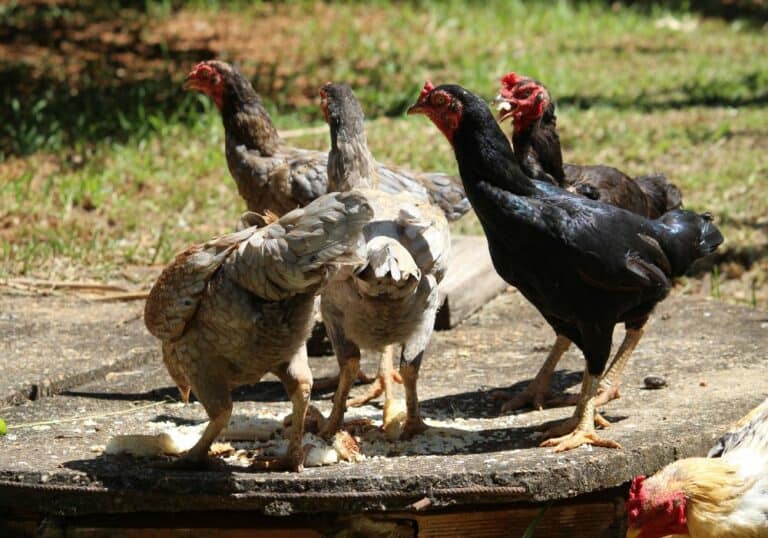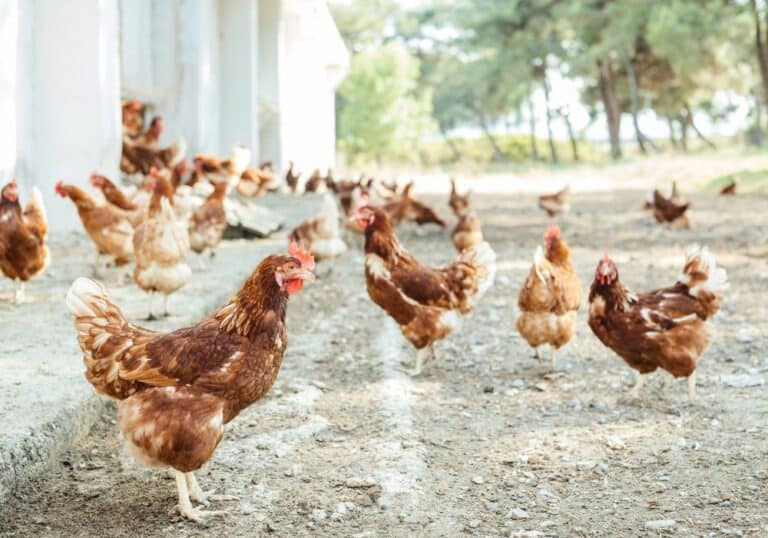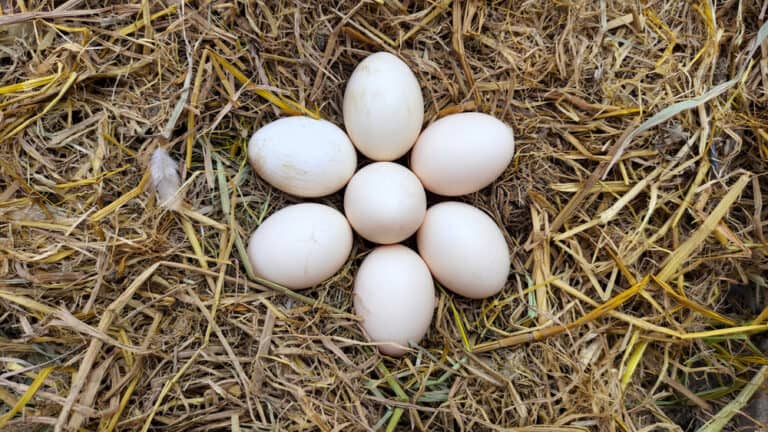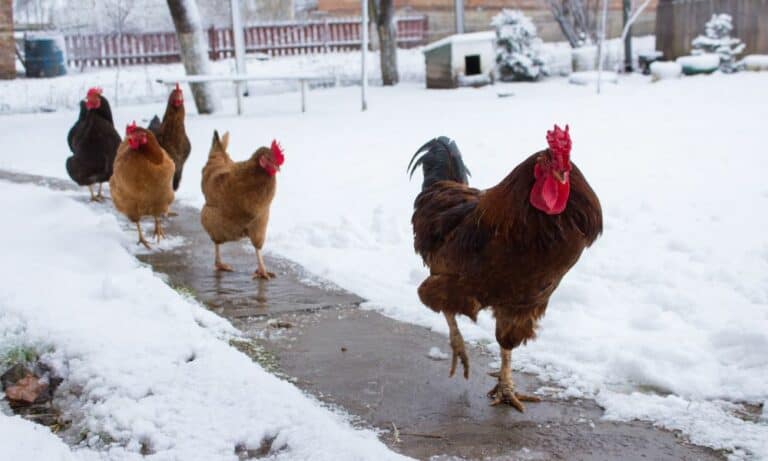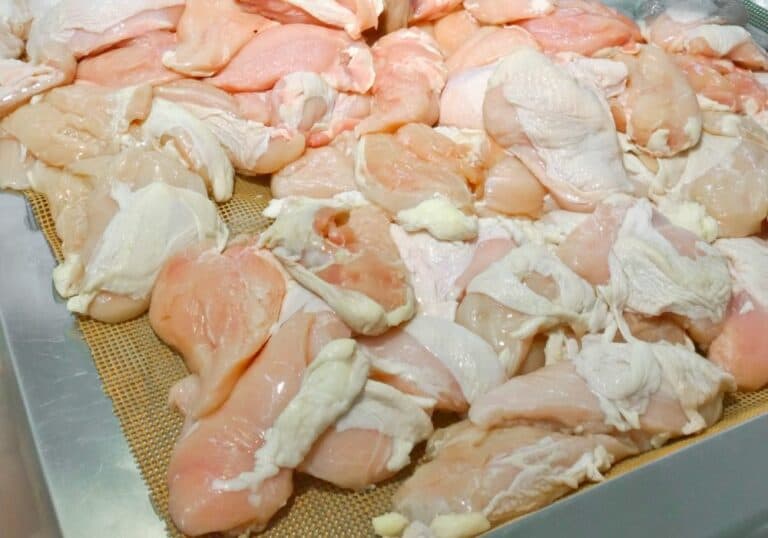Chickens are wonderful animals, not just from a farming standpoint but even as backyard pets. Like any other pet, however, they do have their peculiarities. This means that there are things other pets and animals can do that just aren’t a good idea for chickens.
For example, can chickens swim and should they even if they can? They do appear similar to ducks in many ways yet different in others.
So, if you’ve recently seen a cute video of how a chicken swims in a pond or a different body of water and you’re wondering whether that’s normal and you can let your chickens swim too, we’ll explain whether or not that’s a good idea below.
Can chickens swim?
The short answer here is “Yes, but not really.” Now, let’s elaborate as this may be a bit confusing.
Adult chickens can float for a limited amount of time and they can also paddle through water for a bit with their feet. You can check out this video for a good example.
Although, even “good” can be contested here, as the chicken’s owners keep worsening its satiation by dipping it, tossing it around, and pouring more water on it.
Still, this can be categorized as “swimming” but it’s nowhere near what a dick or another type of waterfowl can do. That’s simply because chickens don’t have the innate ability to swim the same way ducks do. Here are the several key points of difference between them:
- Chicken feathers are not the same as a duck’s waterproof feathers. This means that, while you can see a chicken float for a while, the bird can’t do so for more than several minutes as its feathers will start getting water-logged pretty quickly.
10-15 minutes is usually the maximum in ideal conditions before a chicken starts to sink. This can clearly be a problem in deep water. - Chickens don’t have the webbed feet of ducks which means that they aren’t nearly as good paddlers or good swimmers.
They can paddle and they have the instinct to do so when placed in water, but they can’t move as fast, they can’t take turns nearly as well (or, often, at all), and the best they can accomplish is keep their forward momentum. Which isn’t exactly “swimming” but rather floating. - Ducks have special glands called Uropygial glands that produce various oils and biochemicals. These oils are essential for waterfowl birds as they coat their feathers and make them even more waterproof.
Chickens, however, lack such oil glands which further hinders their resistance to simple wetness. This makes crossing large bodies of water an impossibility for chickens. - Most chickens don’t like water as they don’t have the instinct to feel comfortable in it. When a chicken or a hen enters water, whether by falling or being dropped into it, the most likely reaction would be that it panics and starts splashing in an attempt to get out.
Naturally, this panic only hinders the chicken’s chances for survival even more as it gets even more water under the chicken’s feathers even faster.
Can young chicks swim?
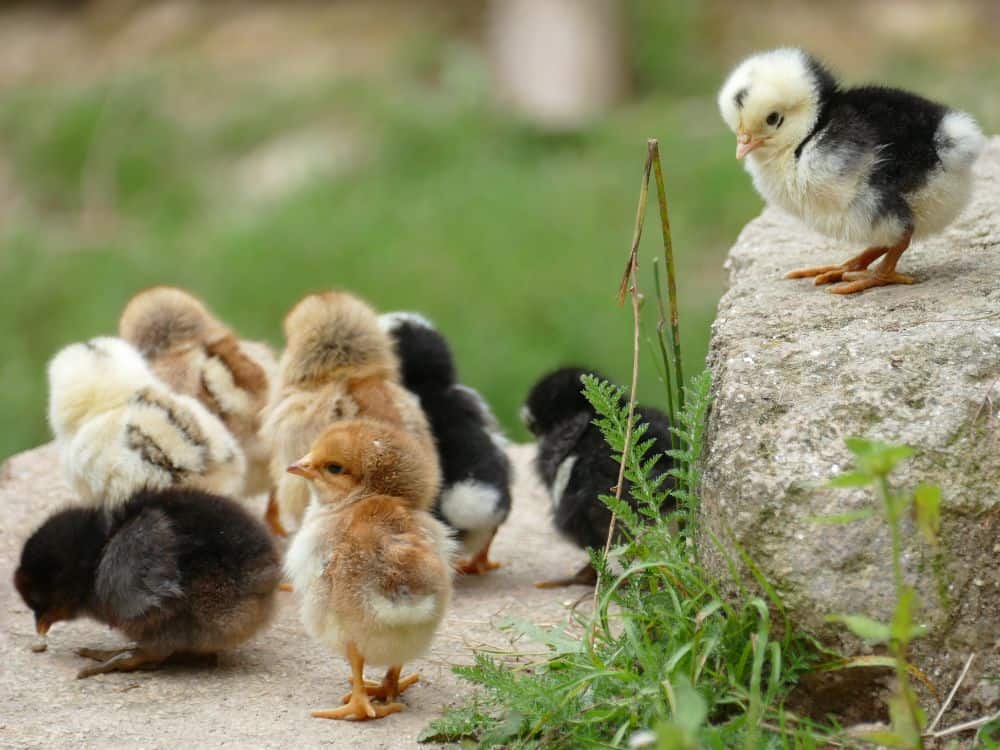
No – baby chicks can’t even float and sink in a matter of seconds. So, even though the idea of putting a baby chick in the kiddie pull to watch them float around sounds adorable, it really isn’t smart.
It is worth noting that the exact age and breed of the chick matter too. Some chicks can develop enough feathering to swim for a bit even while they are still young chicks. Take a look at this young chick eagerly jumping in the water with the ducks and doing quite well for a while.
Hypothetically, you can try dipping a baby chick in really shallow water (an inch or so max) to prevent it from sinking. Another option would be to just hold the chick above the water’s surface yourself. This does bring up the question of “Why even bother?” however. So, let’s explore the reasons for and against letting your chickens swim.
Should you let your chickens swim – Pros and Cons of letting your chickens swim
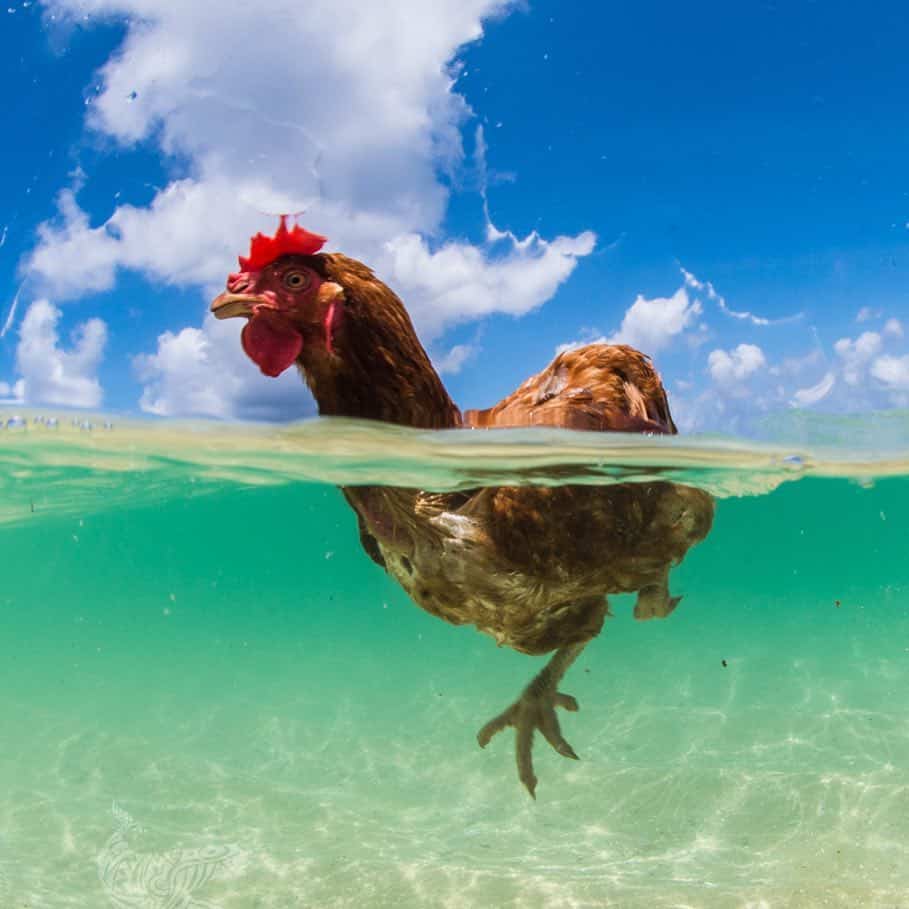
Now that we’ve figured out whether chickens can float and swim, let’s look into whether they should. The simple fact that chickens have the ability to float above water for at least a little while does speak of an evolutionary incentive for them to be able to do so. And it’s pretty clear what that incentive would be – survival.
Even in the forests where chickens used to live before they were domesticated, being able to briefly float and paddle through a small puddle or a stream was beneficial for survival – to escape from a predator, from a forest fire, to get to the treats on the other end of the stream, and so on.
None of those incentives were common or significant enough for chickens to evolve into good swimmers, however, especially not when they are also capable of flight for up to a few dozen feet.
More significantly, however, none of those incentives are really present on a farm or in your backyard. So, are there even any Pros to letting your chickens swim in a pool or are there only Cons?
Pros:
- The most commonly cited reason we’ve heard for letting your chickens swim is to help them cool down during the hotter summer months. And this is a valid argument – hens and chickens don’t deal nearly as well with heat as other farm or backyard animals.
In fact, they are much better adapted to colder temperatures than they are to heat. So, giving your chickens a quick swim in cool water can be nice in the summer. An easy way to do this is to simply install a small kiddie pool in the chickens’ enclosure where they can dip into it when they want or not when they don’t feel like it, as seen here.
- There are also people who say that their chickens enjoy swimming. There are even videos of chickens floating with the ducks, seemingly enjoying themselves. By and large, however, it’s established that most chickens don’t like swimming, even just for short periods of time – it’s just not in their nature. In a way, chickens are similar to cats – rare few like swimming, and most don’t.
Having access to a kiddie pool from early on can help more of your chickens tolerate swimming. - Chickens swimming is just an adorable sight, especially when/if you know the chicken is enjoying it, which can often be discerned by the bird’s body language (not shaking, not splashing water or trying to fly away, not constantly swimming toward the exit of the pool, etc.). So, especially if you have kids, this can be a great communal entertainment for kids and pets alike.
- Цhickens may not be the most intelligent birds on the planet – not as much as ravens, owls, parrots, or pigeons, for example – but they are still relatively intelligent beings.
And, one thing that’s common for all animals above a certain amount of intelligence, is that they need interesting and diverse activities to stay mentally engaged and happy. Swimming can be such an activity for some (few) chickens.
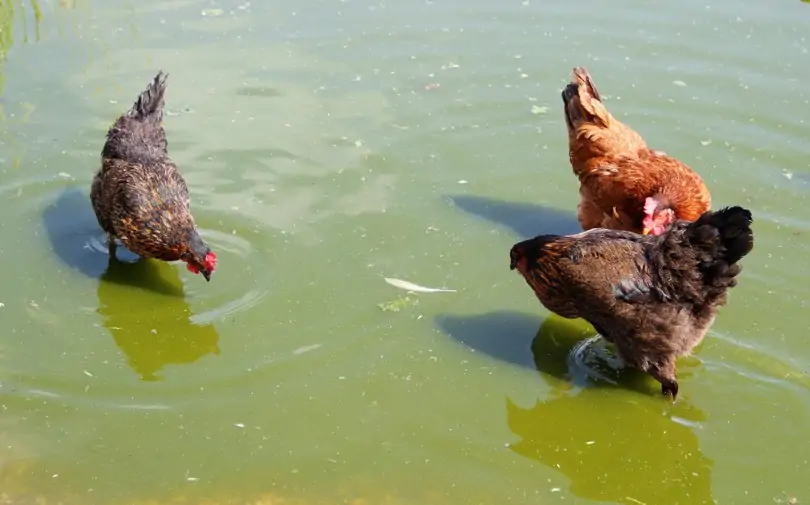
Cons:
- The risk of drowning is often judged to just be too great for it to be worth it to let your chickens swim.
- If the weather is not all that hot or if we’re talking about younger chickens, there is also a significant risk of developing hypothermia.
- If you let your chickens swim in a pool meant for humans, there is a significant risk of them being affected by pool chemicals such as sanitizers, oxidizers, enzymes, algaecides, clarifiers, and others. The evidence here isn’t 100% conclusive but we do know that such chemicals can be deadly to frogs, for example.
- Chickens should always be under supervision when swimming or when they are near an open body of water that’s deep enough for them to drown (several inches or 1-2 inches for chicks).
This can be quite impractical for most people as, even if you’re in your backyard and you have some free time, it can still be a lot of effort to constantly keep an eye on the pool. - There are easier alternatives to keep your chickens cool during the summer heat – giving them cool drinking water, offering treats such as watermelons that have high water content, or even giving them frozen treats.
How to make sure your chickens are safe when swimming?
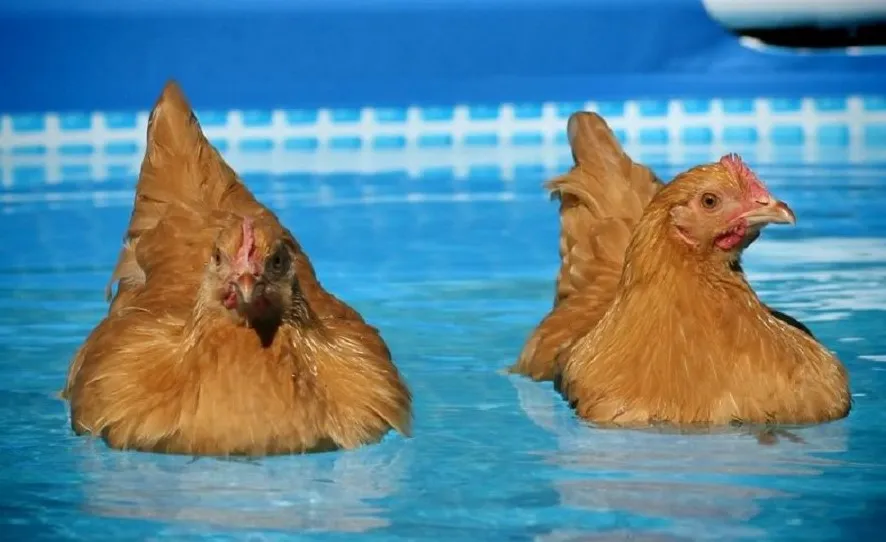
If you are dead set on giving your chickens access to a swimming area – be it because you find this to be the easiest way for you to keep them cool in the summer, because you’ve found that some of them enjoy it, or because you just think it’s fun – there are quite a few tips and tricks you’d do well to employ, as well as some good rules to follow. Here are our suggestions:
- Don’t use a regular swimming pool for your chickens – it’s too deep for them, the chemicals in it are not ideal for poultry birds, and you’d likely want to clean the pool afterward for your own sake anyway. Instead, use a shallow kids’ pool, a small basin or bucket of water, or anything similar.
- Make sure that even if your pool of choice seems shallow enough, there are added measures to aid the chickens in getting out. Something like a few bricks or a ramp near the edge the chickens can climb onto can save a lot of them from drowning and it can ease the need for constant supervision. Yes, chickens can fly for a bit but not so much when they are sodding wet.
- If you have chicks and chickens in the same space, make sure that the chicks can’t get or fall into the pool you’ve added to the space. Or, if they can, make sure that it’s extra shallow – no more than a couple of inches.
That won’t be enough for grown chickens to swim but it will still be enough for them to drink or walk through to cool down. After all, the legs and feet are the parts of the body you want wet with cool water anyway for chicks and chickens to thermoregulate well in the summer. - If you’re going through the trouble of placing the chickens into the water yourself manually, make sure that you only do so for a short period. Leaving even grown chickens in water for long periods of time increases the risks of not just drowning but of hypothermia as well.
- Be mindful of the breeds of chicken you’re dealing with. While most breeds are decent swimmers (or floaters), certain breeds are as bad at swimming as adults as other chickens are as newborns. We are especially talking about the Silkie chicken breed which has a very unique type of plumage that makes them even worse at swimming than ordinary chickens.
- If you want your chickens to enjoy swimming, it’s a good idea to start getting them used to walking into water from an early age. This is similar to how people get their cats used to water – make it fun, rewarding, and safe for the baby chicks.
If you manage to fill a space with no more than an inch of water and you incentivize the chicks to walk through it with treats, they will get used to the idea of walking into a body of water. This way, when you later give them a kiddie pool in the summer when they are grown up, more of them may have the desire to walk in for a swim on their own.
In conclusion
In short, swimming is not something chickens are good at but they can float for a limited amount of time. It’s also not something most chickens enjoy doing instinctively but it can be a fun activity for some individual chickens as well as a half-decent way for chickens to keep cool in the summer.
You do need to make sure your setup is safe, however, as there are a lot of risks when it comes to chickens and swimming.

